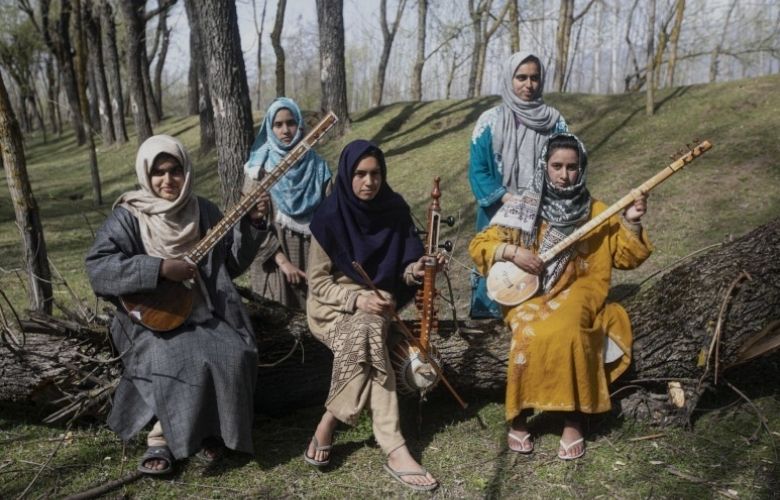
Yemberzal are the first all-women Sufiyana music group in Indian-administered Kashmir. Despite this male-dominated musical tradition dying out in the area, the group have faced difficulties and negative reactions – the father of one of the group’s members was harassed by neighbours, and many have said that Sufiyana “isn’t meant for women”.
The ladies in the band are aged from their late teens to their early twenties – they are:
Irfana Yousuf
Rehana Yousuf, who is Irfana’s younger sister
Gulshan Lateef
Saima Hameed
Shabnum Bashir, who is the youngest member
Together, according to Majalla, these young ladies use Kashmir’s rich heritage of the spiritual poetry of revered Kashmiri Sufi saints Sheikh-ul-Alam, Lal Ded, Haba Khatoon, Ghulam Hassan Gamgeen and others as the foundation of their Sufiyana Mausiqi (Sufi music).
Irfana first began playing music after learning the santoor and Saaz-e-Kashmir instruments from her musician father before taking formal lessons. Soon enough, her natural affinity enabled her to master several more classical instruments that included the sitar and tabla. When Irfana landed a gig performing on the state TV station in 2011 she was aged just 13, and made a huge impression on girls who saw her accomplished performance – following this appearance many girls from the local village and school got in touch as they also wanted to learn how to play.
Irfana’s schoolmate Gulshan and sister Rehana also felt inspired, and the band began. Shabnum would have to attend their rehearsals in secret as first as her parents did not approve, only eventually relenting and allowing her to play on the condition that her traditional studies would come first. Saima was from a different village, and moved school after hearing the girls’ music to be close by and be able to join the band. Yemberzal officially formed in 2015.
Irfana explained the choice to make Sufi music came out of several reasons – both in the hopes of less public backlash, and to prolong the classical tradition. She said:
“We decided to focus on Sufiyana mausiqi because nowadays every musician is inclined toward contemporary music. People have forgotten about our classical music. We decided to create a band and revive the dying art form.”
Despite this, the band have faced criticism – in 2012 the Kashmiri female rock band ‘Pragaash’ attracted such a grossly negative reaction and a fatwa against them (a fatwa is a formal Islamic religious ruling) that they disbanded after mere months. Refusing to bow down, the women of Yemberzal remain steadfast in their love of music and mission to change things – they are happy if they can change mindsets “even if just a little”. Gulshan elaborated on their hopes for a better quality of life for women is what keeps them going:
“Some people kept saying that we are girls and we should not do something like this. That we should stay at home and do the home chores. They believe that this is what women are meant for. A woman has to do everything.”
In the face of haters, the girls are still going from strength to strength, with the band winning several prizes, and Irfana and Gulshan currently attending the University of Kashmir as music students. Looking to the future, they would like to one day open their own Sufiyana music school when they have completed their studies. Irfana said:
“More yemberzals [budding artists] will mark new beginnings to keep the music alive after us as well.”
The ‘Yemberzal’ is a sign of springtime in Kashmir. The Kashmiri Narcissus or Daffodil is the first flower that Kashmiris see after the severe winters.
Sufiyana is the music of Sufism, which is a mystical form of Islam. It is thought to have originated in the 15thcentury.
Sufiyana music has 12 basic overarching muqams – a collection of distinct melodies or surs. All muqams have specific timings linked to the sun. For example, muqam-e-todee can only be performed between 11AM and noon.
Speaking to Vice, Irfana explained:
“All these muqams have branches called goshe, shobe, and parde; collectively they generate a total of 118 muqams. Currently, no one knows 118 muqams, not even our teachers. There are only 60-70 muqams that experts can play, and I want to learn them all and document them. Otherwise, this art will vanish.”
Following difficulties in Kashmir since 2019 that include oppressive military checks in the streets, internet and communication blackouts which were then swiftly followed by the nightmare of the pandemic, it has meant that there are even more barriers to women being able to achieve equity or even basic movement outside the home.
As the women continue to create in the face of these difficulties (Irfana is currently writing a book about the rules and theory of the Sufiyana musical tradition) it is a pleasure to be able to share the music and story of Yemberzal.
Accessibility At The Smith Center Series: Part One
James “Fitz” FitzSimmons Interview: The Boys In The Band On Netflix


Michelle is a musician and composer from the UK. She has performed across the UK and Europe and is passionate about arts education and opportunities for women and girls.
Read Full Profile© 2021 TheatreArtLife. All rights reserved.

Thank you so much for reading, but you have now reached your free article limit for this month.
Our contributors are currently writing more articles for you to enjoy.
To keep reading, all you have to do is become a subscriber and then you can read unlimited articles anytime.
Your investment will help us continue to ignite connections across the globe in live entertainment and build this community for industry professionals.